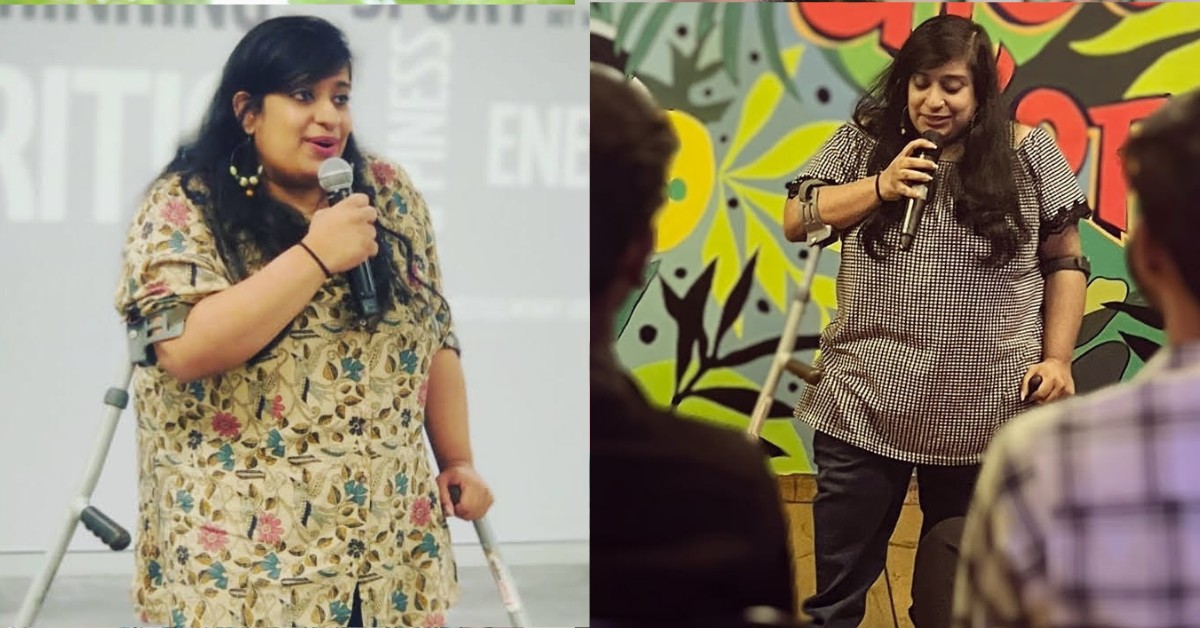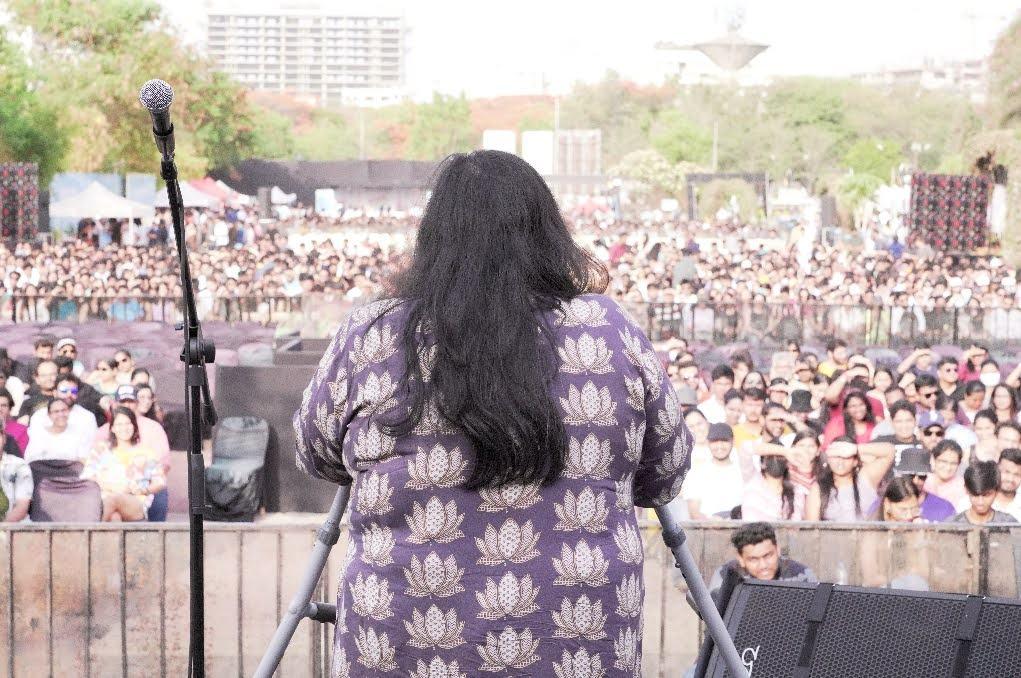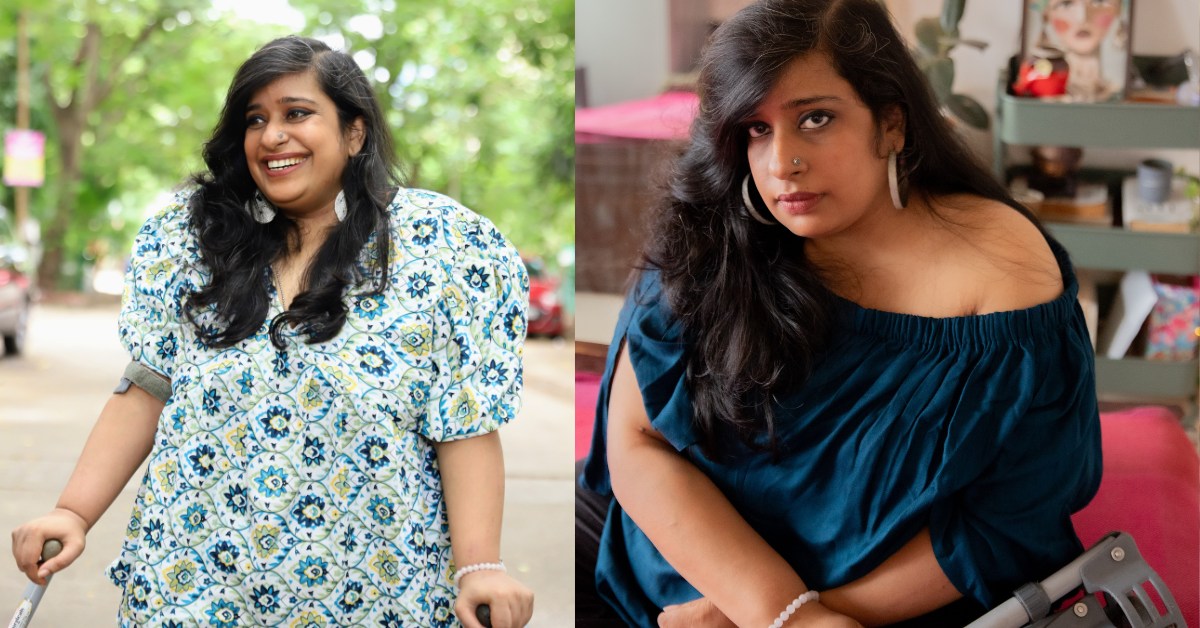In 2016, while recovering from a fracture and binge-watching stand-up comedy on YouTube, Sweta Mantrii had a revelation: “I’m witty too. Why not merge that with comedy about disability?”
This sparked her journey into using humour as a tool for change.
Sweta, now 36, was born with spina bifida — a condition where the spine and spinal cord don’t develop properly, leaving a gap in the spine. Just before starting school, she underwent surgery and physiotherapy, which enabled her to walk using crutches. Women with this condition typically reach a height of about 4.6 feet, shorter than the general average of 5.2 feet.
Her foray into comedy was initially inspired by her admiration for Indian comedians like Aditi Mittal, Azeem Banatwalla and Daniel Fernandes. She later explored the work of global comedians, such as Hannah Gadsby, Taylor Tomlinson, Ali Wong, and Jerry Seinfeld.
While Sweta started with the intention of channelling her personal struggles as a disabled woman into comedy, her purpose soon evolved. She wanted to prove that people with disabilities can not only make jokes but also laugh at themselves.
The first few performances were downers
When Sweta first ventured into stand-up comedy in 2016 in her hometown Pune, she noticed people often pulled back when they saw her on stage. “It was tough because people weren’t used to the idea of a disabled woman doing comedy; it was a real downer,” she recalls.
Today, she has performed at over 300 venues, including Boka Book Cafe, Vintage Comedy Club, Classic Rock Cafe, Space Comedy Club, Hippie at Heart and The Comedy Clubhouse in Pune and has been an advocate for disability inclusion for over a decade.

“There’s a running joke in my family, and it’s not me,” she jokes on her WhatsApp status.
During her early comedy years, both audiences and peers often asked her why she chose to address her disability in her act rather than sticking to regular jokes.
Back then, she was quite blunt with her comedy. One of her opening lines is, “If you feel awkward looking at my crutches, you can ignore them — like your crush ignores you.” While this might seem like dark humour, it was her way of addressing ableism towards people with disabilities.
She soon realised that getting people to accept her as a comic who centres her acts on her disability would be a long journey. So she began her sets by reading the room and tailoring her jokes to match the audience’s mood. It took some time to understand which jokes landed and which didn’t. “There were times when people seemed to feel awkward to watch a disabled person go on the stage and get uncomfortable to laugh at their jokes,” she shares.
Looking back, Sweta acknowledges that her jokes might have been a bit harsh as she was still learning the subtleties of comedy and effective delivery. Now, she spends the first few minutes easing the audience into her performance before delivering her strongest jokes.
‘Will I even be able to reach the stage?’
When a comedian is offered a gig, they usually ask: How many minutes will I be performing for? How much does it pay? Sweta’s concerns are focused more on the issue of accessibility: “Is the venue accessible for me? Is there an accessible restroom available? How many steps are there, and how long will it take to get to the stage? Will I even be able to reach the stage?”
At one of her early comedy shows, she faced a tough setup with a mat that was slippery, making it hard for her to manage her crutch. When the audience saw her struggle, it created tension in the room. She recalls that while previous comics had successfully warmed up the audience, the vibe of the room changed when they saw special arrangements made for her.

“Jokes that should have landed well ended up falling flat because they weren’t used to seeing someone like me go up to a stage to perform comedy before,” she notes.
To tackle this, Sweta eases her anxiety by making light of her struggle to get on stage. If the steps are particularly steep and it takes time to climb, she jokes, “Oh, thanks for clapping for two hundred years, guys!” or “I’m the disabled one here — what’s wrong with you, why did you stop clapping?”
Sometimes, she even references a popular meme from the 2006 film Vivah, saying, “Jal lijiye, thak gaye honge clap karte karte.” She adds, “If the audience sees me struggling due to the infrastructure, I have to address it. If I don’t, it impacts my performance.”
Choosing to perform stand-up comedy is in itself a rebellious act
“The term ‘stand-up’ in stand-up comedy could be seen as somewhat ableist, particularly from a disability-focused perspective,” Sweta muses.
“The typical image of a stand-up comedian involves a performer standing on stage, which can be at odds with the accessibility-centred narrative we strive for today. Generally, people with disabilities are imagined working from home or, if they’re comedians, performing on Zoom or writing funny blogs. Choosing to perform stand-up comedy in person is in itself a rebellious act,” she points out.
Being the only Indian stand-up comedian with spina bifida has made Sweta aware that her comedy has a deeper purpose: to shed light on the issues confronting people with disabilities and to ask her audience to think more deeply.
According to Mandar Latkar, a peer in the stand-up comedy scene who has witnessed her craft up close, Sweta excels at addressing tough issues with humour. “Sweta boldly addresses challenging themes, including her personal experiences,” adding that she’s not afraid to confront topics that might have once been uncomfortable for her. He also highlights that Sweta wraps up her comedy sets with a segment focused on educating the audience about disability and correcting common misconceptions.
When asked if she believes her voice has changed over the years to better connect with her audiences, she responds, “I don’t think my voice has changed dramatically.” Sweta remains committed to her voice but has refined how she discusses her experiences. “Choosing not to talk about certain things has never been an option for me, and it never will be,” she states firmly.
When she’s not writing comedy, Sweta finds meaning in her advocacy work for individuals with disabilities. Why does she do it? “Because disability isn’t the problem, accessibility, or the lack of it, is,” she says.

It was during her school years that Sweta first realised how unaccommodating society could be towards people like her. She vividly recalls a moment when a teacher allowed all the other children to play outside but told her to stay in the classroom. “Even my parents let me join the other children in our housing colony,” she rues.
After completing her postgraduate studies at Symbiosis Institute for Media and Communications in Pune, Sweta was offered a position at Blue Lotus Communications, a PR agency in Mumbai. Her parents were hesitant about her relocating, but her boss made a special trip to Pune to convince them. Although she moved to Mumbai, the travelling in monsoon became too tiring, prompting her to return to Pune, and she ultimately decided to quit.
“When I first moved to Mumbai for work, it took me two months to find a hostel with a lift,” she recalls. It was during this period that she became resolute in her goal to bring attention to the challenges faced by people like herself.
Using her voice to push for greater accessibility
Sweta shares that her parents have always motivated her to use her voice for change.
Looking back at a 2007 family trip to Rajasthan, she remembers an incident where a restaurant staff member denied her access to the restroom, saying it was only for expats. As a 20-year-old, she was infuriated. “My parents encouraged me to write to the Prime Minister or the Chief Minister,” she recalls with a smile.
One of her earliest initiatives was a project called ‘Give Some Space’, which she launched with her friend Vishal Sawvaant, a wheelchair user. Together, they installed ramps on SB Road, Fergusson College Road, and nearby areas in Pune, making it easier for wheelchair users to access bookstores, restaurants, and educational institutions. “The lived reality of wheelchair users is so ignored that they often don’t even have the option to visit a college to inquire about admission,” she points out.
In 2017, Sweta and her cousin Nalini Mangwani created an art installation called the Restroom Project. The artwork depicted a map of restaurants in Pune on a cardboard canvas painted with bright blue strokes. The map included landmarks shaped like toilet seats to illustrate the challenges of finding disability-friendly restrooms. Opening each commode lid on the canvas revealed whether the restaurant was accessible by people with disabilities, whether there were steps to the restroom or other relevant features.
When asked about how she sees her comedy progressing, Sweta says that there are many aspects of her life that she’s yet to figure out, including nuances of living with a disability.
“I definitely want to talk more about the role that upbringing and conditioning play in the context of people’s perception of people with disabilities. Sometimes, even after seeing me on stage, people still believe that those with disabilities should stay quiet and not talk about their challenges,” she shares.
Her message to people with disabilities thinking about getting into stand-up comedy is simple: “Own your space and speak boldly. Speak your mind confidently, without worrying about how others might react. Be yourself and don’t change who you are to fit into a mould.”
You can book Sweta for shows by contacting her via Instagram (@imadmantrii), LinkedIn, or email at iamadmantrii@gmail.com.
(Edited by Pranita Bhat; Images Courtesy Sweta Mantrii)
No comments:
Post a Comment